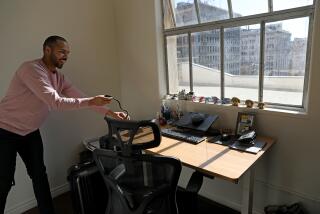South Korea’s Real Estate: ‘Open House’ on a Global Scale
- Share via
In Min Kee’s world, there is no time for self-pity or nationalist pride. He is prepared to offer Americans just about anything they want--at the right price.
“We are here to sell,” the manager from Korea Land Corp., a government real estate development agency, said during a recent stop in Los Angeles. “We can sell everything but our families.”
At the tail end of a tiring sales trip across the United States, Min is willing to try just about any tactic, including self-deprecating humor, to drum up interest in his ballooning property portfolio.
Looking for a high-rise office building in Yoido, Seoul’s financial district? How about a luxury resort on Cheju Island, the popular honeymooners’ destination? Min is certain he can meet your needs from among the $2.2 billion worth of real estate his agency has agreed to liquidate for distressed South Korean firms.
“We expect there will be another profitable year or years when our economy recovers,” Min said. “But we need to get money in our pockets now. That’s our bottom line.”
Min is part of an army of South Korean officials and executives circling the globe looking for buyers for high-rise office buildings, resorts and golf courses built before last summer’s currency crisis brought Asia’s high-flying economies to the brink of collapse.
It’s a buyer’s market, particularly for U.S. investors armed with a dollar that has strengthened by as much as 80% against the hardest-hit Asian currencies.
But South Koreans, in fierce competition with debt-strapped investors throughout Asia, are balking at lowering their prices enough to close many deals. And prospective buyers have been further spooked by the slide of the Japanese yen, which threatens to send the rest of Asia into another nose dive.
Worried Asian officials got some breathing room Wednesday when the U.S. government intervened in currency markets to bolster the yen.
But that relief could be short-lived unless the Japanese government moves quickly to reassure investors that it is serious about tackling its bad loans and further stimulating its economy.
In the meantime, pressure is building in South Korea, where bankruptcies and unemployment are on the rise. Prices of downtown office buildings have dropped by at least 30%, and land is being sold at half-price, according to Korean real estate experts. Vacancy rates in downtown Seoul have climbed to 30%.
A scarcity of mortgage financing meant that most prime real estate in South Korea was purchased on an unsecured basis by the giant chaebol, or conglomerates, that had easy access to low-cost financing. Now those companies are under mounting pressure to raise cash to reduce their debt.
Earlier this month, three of the nation’s giant chaebol--Hyundai, LG Group and SK Group--announced plans to sell real estate assets and subsidiary companies valued at about $12.5 billion, according to E&Y; Kenneth Leventhal Real Estate Group.
To boost his country’s appeal, South Korean President Kim Dae Jung is acting quickly to remove laws restricting foreign property ownership and to offer expanded tax breaks and other incentives. Korean firms that dispose of nonbusiness-related real estate are being offered tax concessions.
South Korean officials are also working hard to dispel the image that they are hostile to foreigners or foreign capital.
“It has often been said that the negative attitude of Koreans toward foreign companies acts as a major obstacle to attracting foreign investment,” Tae Young Park, Korea’s Minister of Commerce, Industry and Energy, told a luncheon crowd at a recent real estate seminar in Los Angeles. “However, the shock of the economic crisis has dramatically changed this attitude.”
The flow of foreign money into South Korea is starting to pick up, jumping to $570 million in April from a low of $90 million in November, according to the Korean government. U.S. investors account for about one-third of the total.
But most of that investment is being made by foreign firms that already have operations in South Korea and are taking advantage of the depressed market to expand their presence.
Earlier this year, Hewlett-Packard, which has been operating in South Korea since 1974, purchased its headquarters building in Yoido for $100 million.
In addition, the Silicon Valley company announced it will invest $150 million more to establish a finance company and expand its present facilities.
“The U.S. dollar goes a lot further and there are many Korean companies in their restructuring plans who are looking for cash,” said Brad Whitworth, a Hewlett-Packard spokesman.
Most investors are holding back, however, convinced that prices haven’t fallen far enough and fearful that the continuing weakness of the Japanese economy will send the region into another free fall.
Stewart Kim, managing partner of Los Angeles-based Pacific Gemini Partners, an asset management firm, recently arranged meetings between officials from Korea Asset Management Corp. and some leading U.S. real estate investors.
Korea Asset Management was established to take on the bad debt of the Korean banks. So far, the agency has acquired $11 billion in loans and is expected to acquire $30 billion more by year-end, according to Kim.
But he said no deals came out of that meeting because of a huge “perception gap in value.” Although U.S. investors are focused on current cash flow, South Korean property owners still believe a property’s price should reflect its future earning potential when the economy recovers.
“Many Japanese real estate loans are now trading at 7 to 10 cents on the dollar,” Kim said. “It will be a long time before Koreans will accept that. Therefore, Korean real estate is currently a zero-transaction environment.”
Jay Kang, president of IDN Consultants Inc., a Seoul-based real estate consulting firm, said South Koreans are resistant to selling their real estate at fire-sale prices because they have always considered property to be recession-proof.
“When you measure how much someone is worth in America, it is how much you earn,” he said. “In Korea, it is how much you own.”
Kang said foreign buyers should be willing to assume more risk and “compromise” on a selling price that reflects Korea’s basic economic strengths and potential for recovery.
Kenneth Townsend, managing partner of E&Y; Kenneth Leventhal, said South Koreans, like many other Asian property owners, simply haven’t had time to adjust to the post-financial-crisis environment.
South Korea has a system for pricing property, but it is not well-developed, because companies have traditionally held on to their properties.
“A new standard has to be created for valuing real estate,” Townsend said. “In a falling market, appraisers just can’t keep up.”
Townsend said the governments of South Korea, Japan and other hard-hit Asian countries need to develop tools that will encourage the sale of property, such as the creation of title insurance, revising the bankruptcy laws and providing the legal framework to securitize assets.
“Of the Asian countries, Japan is the furthest along on securitization,” he said. “That’ll set a model in the Pacific Rim. But it will take time.”
More to Read
Inside the business of entertainment
The Wide Shot brings you news, analysis and insights on everything from streaming wars to production — and what it all means for the future.
You may occasionally receive promotional content from the Los Angeles Times.










